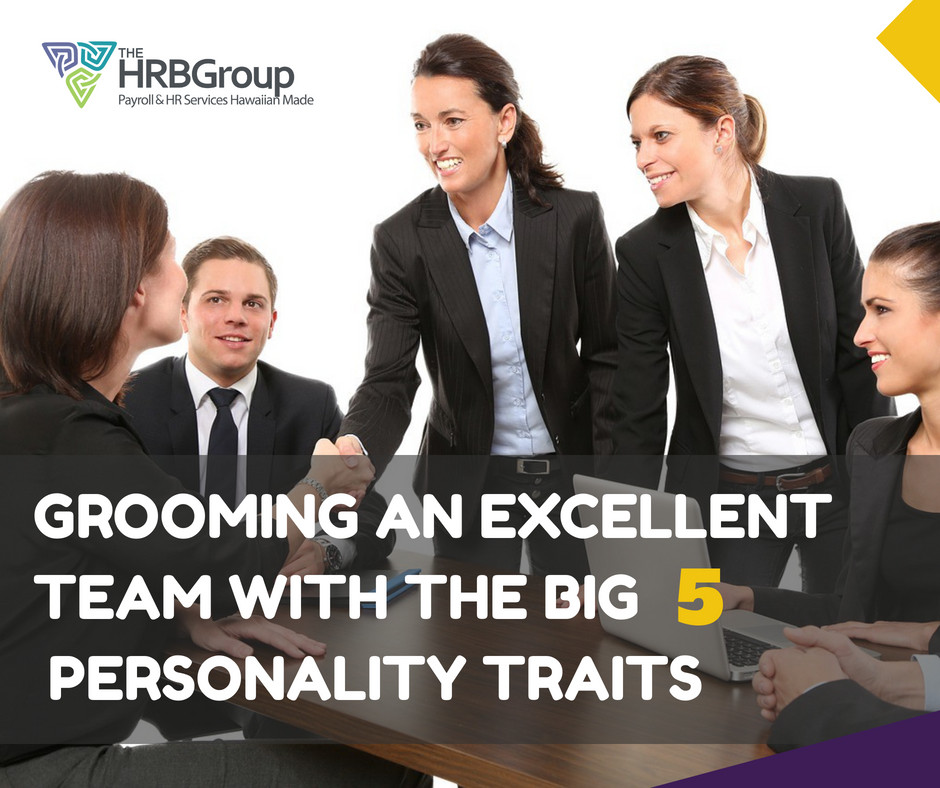
Grooming an Excellent Team with the Big 5 Personality Traits
Building an excellent team in the work place keeps things running smoothly like a well-oiled engine. There might be conflicts here and there because of this diversity, but it is worth it when the diversity encourages productivity. So, what exactly is the big 5?
Two groups of personality researchers independently concluded sometime in 1970, that most of the human character or personality traits boils down to five broad categories, what is now known as the Big 5. These traits are: openness, conscientiousness, extraversion, agreeableness, and emotional stability.
- Openness. People with this trait are more open to new experiences. They are creative, imaginative and very curious. They enjoy adventure and are quick to learning new things. They work well in a team and often provide fresh ideas and insight on the spot. People who are opposites of these, are individuals not open to experience. They are predictable and more traditional. They work best in the team that has guidelines, protocols and routines.
- Conscientiousness. This trait shows people who are very organised, dependable, hardworking and cooperative. They are quite the workaholics, but their compulsive, fastidious nature can be annoying. The opposite end of this trait is an easy-going but disorganised employee. They are great at handling short term goals and multitasking.
- Extraversion. People with this trait are very sociable, expressive and enthusiastic. They enjoy being around people and working as part of a team. Extraverts can be very assertive and domineering but they would make good team leaders. The opposite of this trait is introversion. Introverts are unsociable, reserved and quiet. They prefer to work alone or in small teams. They do better work solo and handling task-oriented roles.
- Agreeableness. People with this trait find it easy to trust and help others, they are very compassionate. They are friendly, cooperative and helpful. They work well with members of their team in reaching decisions peacefully. The opposite end of this trait shows people who are very challenging, self-centred and competitive. They make tough and objective decisions even though they may find it difficult to work peacefully in a team.
- Emotional stability. People with this trait are very confident and are not given to worry. They are very composed and calm even in the face of pressure, they make effective and stable team leaders. On the other end of this trait are neurotic employees who suffer high level of insecurity, anxiety and depression. With the right encouragement and motivation, they can work very well in teams. They don’t make good team leaders because they can’t handle stress and can barely control their emotions.
Every personality trait has its strengths and weaknesses. It is important to note that no one is better than the other as every trait is needed for an effective team.
Understanding the personality traits of your workers would go a very long way in creating a productive and professional atmosphere.
Grooming an excellent team using personality traits.
First of all you need to know what you are looking out for. What kind of person are you hoping to fill in the new position available?
Don’t hire the traits you already have on your team. It’s important you understand your employees through this big 5.
Have a blue print of the personality traits you already have on ground and map out the ones you need. This way you already know the kind of person you are looking to hire. Apart from their experiences and skills, the right personality to fit into your team is very important.
Pair new employees with team members whose personality trait is a match. Pithing new employees with team members whose personality don’t match is a recipe for disaster, especially on the side of the new member.
If you want a team member to show a new employee the ropes, having an understanding of their personality traits will help you know who the best person is to pair with. It will make the process smoother and easier. It’s easier to resolve conflicts when you can understand the personalities of your employees.




